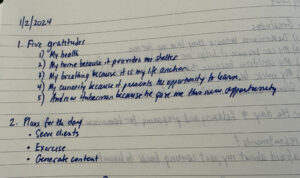We all know January 1st is probably the most common day for people to start new habits. To be clear, I am NOT a New Year’s resolution guy. I believe that if you want to build a new habit then start when you are ready whether it’s January 1st or May 12th. However, I’m at a point in my life right now where it’s time to start building better habits – physical, mental, and emotional habits. It just so happens that the time to change is around the start of the New Year. Mostly coincidental, but maybe also a result of some year-end reflection that’s spurring change.
One simple practice that has historically helped me build better habits, focus my energy and attention, and hold myself accountable is journaling. Journaling is something that I often suggest to my young athlete clients as a reflective, learning tool. Journaling is a great way to build awareness on a consistent basis, which often leads to self-improvement.
When thinking about journaling, you might envision long flowery passages that result in us dumping our feelings onto pages and pages of a notebook. Don’t get me wrong – this type of journaling can be very valuable. I’ve done this type of journaling in some of my darkest times as a way to normalize my thoughts and feelings. However, that’s not what I’ll be discussing here.
The type of journaling that I like most for myself – and for my clients – is short and sweet. There is a minimal amount of time required to do it. The journal entries are prompted, meaning that there are questions or subjects that need to be addressed directly. You don’t have to be creative or think too hard. This type of prompted journaling allows us to focus our attention on what’s most important to us on a given day and helps us build a storehouse of information over time if we stick with the daily practice.
I’m borrowing this journaling protocol from Stanford neuroscientist Andrew Huberman. You may be familiar with Dr. Huberman given that he has a pretty popular podcast these days called The Huberman Lab. It’s worth a listen if you are a nerd about human behavior and performance like me. I like his approach because he relies on applying scientific evidence to address real-life challenges. I would say that our professional philosophies are similar in this respect.
In an Instagram post on December 28, 2023, Huberman suggested an evidence-based journaling protocol with five simple prompts.1 The five prompts are as follows:
- List five (5) gratitudes
- Identify your plans for the day
- Identify any fears or resentments
- Identify things to watch out for
- Identify things to strive for

By Huberman’s estimation, this should require 3 to 5 minutes in the morning. By my estimation, this seems completely feasible and is worth trying for at least one week as he suggests in his Instagram post. He and I are also similar in this philosophy of trying it for a bit and if it doesn’t work for you, then drop it. If something isn’t working for you, then don’t force yourself to do it. Then it will just become one of the resentments listed in your daily journaling protocol.
I started this protocol on January 1st in the most cliché way possible. I bought myself a new notebook and pens to dedicate to the process, which I always find weirdly satisfying. I love notebooks and pens, and much prefer to write out my thoughts than typing them on a computer or phone. Just going through this ritual felt like a treat to me.
Since it’s only been two days, it’s hard to say whether the journaling protocol is “working” or not. However, I do appreciate the simple structure the protocol provides to the day. I also particularly appreciate the “fears or resentments” prompt.
I don’t often think consciously about my fears or resentments, but they are probably the biggest obstacles to moving forward in my life. Fears and resentments have paralyzed me at various times in my life. I know that If I am able to identify them before my day starts, then there is probably a greater likelihood that I will be able to navigate around or through them. Or, at a minimum, I can accept them knowing that they will only temporarily affect me.
I can say with confidence that various forms of journaling have helped me and my clients over the years, primarily because of the simplicity that it can create. Many of us become overwhelmed by the unending array of responsibilities that we have and the unending array of things that are out of our control. The type of prompted journaling that I’m suggesting forces us to simplify our focus and direct our energy to the most important things on a given day. There is a lot of value in simplifying our days on a consistent basis.
If you were so inclined to try this journaling protocol, then here are three suggestions that might help get the most out of it:
- Don’t overthink – trust your instincts. Many of us fight the urge to be perfect. I want to do this perfectly. I want to find the perfect answer. However, this is largely unrealistic and often can be debilitating. Jot down the first thing that comes to mind. It’s likely that this instinctive response is what’s at the top of your mind.
- Set yourself up for success. Create the conditions for a successful routine. Put your journal in a place where you are most likely to access it. Complete your journal at a set time every day – first thing in the morning, while you are drinking your coffee, after you get out of the shower, etc. You are likely to stay consistent with journaling if you plan out your routine.
- Take a quick inventory of your day before you go to bed. Huberman’s protocol doesn’t specify a reflective protocol at the end of the day, but taking just a minute or two to evaluate your day before you go to bed can help you assess what you learned and plant the seeds for your priorities the next day.
References
- Retrieved from: https://www.instagram.com/p/C1ZtU2frjGE/

